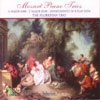Mozart Piano Trios Nos 1 & 5; Divertimento
The Florestan complete their set – and jump to the top of the list
View record and artist detailsRecord and Artist Details
Composer or Director: Wolfgang Amadeus Mozart
Genre:
Chamber
Label: Hyperion
Magazine Review Date: 6/2007
Media Format: CD or Download
Media Runtime: 60
Mastering:
Stereo
DDD
Catalogue Number: CDA67609

Tracks:
| Composition | Artist Credit |
|---|---|
| Divertimento |
Wolfgang Amadeus Mozart, Composer
Florestan Trio Wolfgang Amadeus Mozart, Composer |
| Keyboard Trio No. 1 |
Wolfgang Amadeus Mozart, Composer
Florestan Trio Wolfgang Amadeus Mozart, Composer |
| Keyboard Trio No. 5 |
Wolfgang Amadeus Mozart, Composer
Florestan Trio Wolfgang Amadeus Mozart, Composer |
Author: Richard Wigmore
So much of Mozart’s instrumental music is opera by other means. The Florestan understand this as well as any group, and better than most. At the start of K548’s airy finale, Susan Tomes’s gracefully demure piano is swiftly countered by Anthony Marwood’s raffish forte riposte: and this sense of delighted, quick-witted dialogue between quasi-operatic protagonists runs through the whole movement, abetted by touches of sly, subtle timing, from Marwood especially. No performance of this piece has ever made me smile as much.
More than either the Beaux Arts, 1960s-vintage, or the Gryphon Trio, the Florestan have the knack of bringing alive even apparently neutral figuration, of sensing the possibilities of interplay in what may look like a simple theme-plus-accompaniment texture. Piano and violin dominate in these works, especially in the breezy early Divertimento, K254. But Richard Lester’s warm, nutty timbre contributes crucially to the music’s colour, here and elsewhere, while he takes his chances when Mozart gives the cello an equal voice in the texture: say, in the first-movement development of K496, where the Florestan typically conjure a vivid operatic imbroglio.
As usual, the Florestan choose flowing speeds in the slow movements, which may initially faze those who know the music from the revered Beaux Arts versions (the Gryphon take a similarly expansive approach). In K548’s Andante I particularly like the Vienna Piano Trio, who with their (only slightly) broader tempo and more generous rubato find more intensity than the Florestan in the chromatically troubled development. But in the 6/8 Andante of K496 the Florestan show that a graceful dance lilt, even a hint of skittishness, need not preclude an eloquent response to Mozart’s extraordinary remote modulations.
Talk of an outright winner is always dangerous. For my taste, though, the Florestan’s sparkling, inventive performances, on this disc and its companion (8/06), make them a top recommendation for the complete Mozart trios, their claims enhanced by the warm, ideally balanced recording.
More than either the Beaux Arts, 1960s-vintage, or the Gryphon Trio, the Florestan have the knack of bringing alive even apparently neutral figuration, of sensing the possibilities of interplay in what may look like a simple theme-plus-accompaniment texture. Piano and violin dominate in these works, especially in the breezy early Divertimento, K254. But Richard Lester’s warm, nutty timbre contributes crucially to the music’s colour, here and elsewhere, while he takes his chances when Mozart gives the cello an equal voice in the texture: say, in the first-movement development of K496, where the Florestan typically conjure a vivid operatic imbroglio.
As usual, the Florestan choose flowing speeds in the slow movements, which may initially faze those who know the music from the revered Beaux Arts versions (the Gryphon take a similarly expansive approach). In K548’s Andante I particularly like the Vienna Piano Trio, who with their (only slightly) broader tempo and more generous rubato find more intensity than the Florestan in the chromatically troubled development. But in the 6/8 Andante of K496 the Florestan show that a graceful dance lilt, even a hint of skittishness, need not preclude an eloquent response to Mozart’s extraordinary remote modulations.
Talk of an outright winner is always dangerous. For my taste, though, the Florestan’s sparkling, inventive performances, on this disc and its companion (8/06), make them a top recommendation for the complete Mozart trios, their claims enhanced by the warm, ideally balanced recording.
Discover the world's largest classical music catalogue with Presto Music.

Gramophone Digital Club
- Digital Edition
- Digital Archive
- Reviews Database
- Full website access
From £8.75 / month
Subscribe
Gramophone Full Club
- Print Edition
- Digital Edition
- Digital Archive
- Reviews Database
- Full website access
From £11.00 / month
Subscribe
If you are a library, university or other organisation that would be interested in an institutional subscription to Gramophone please click here for further information.




